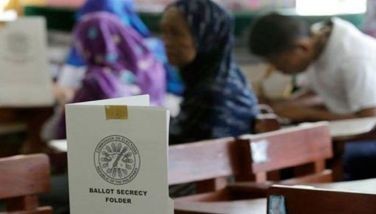Tribal Vendetta in Kalinga slay eyed
April 9, 2007 | 12:00am
LA TRINIDAD, Benguet  More than politics, tribal vendetta is being eyed by authorities as the motive in the killing of Kalinga’s gubernatorial bet Rommel Diasen on Black Saturday.
Policemen investigating the killing of Diasen had noted the assassination of former judge Milnar Lammawin two years ago which they believed also stemmed from tribal disputes.
Lammawin was killed by gunmen coming from the Mountain Province where Diasen has his native roots.
Although a long-time resident of Tabuk, Kalinga, where he served as town mayor for three consecutive terms since 1986, Diasen is a native of Mountain Province.
Cordillera Autonomous Region (CAR) regional police spokesman Superintendent Joseph Adnol said Diasen, incumbent vice governor of the province, was killed in the village where some of the relatives of Lammawin also live.
Diasen, the gubernatorial bet of administration Lakas-Christian Muslim Democrats, was shot at close range by an unidentified man in the middle of a campaign speech in Barangay Magnao in Tabuk.
The suspect, armed with a .45 caliber pistol, mounted the stage where Diasen was delivering a speech and shot him six times at close range in the head and body.
Cordillera police director Chief Superintendent Raul Gonzales formed Task Force Diasen, which, he said, would look into the political angle in the gunslaying.
Adnol said there are witnesses who have identified the gunman but stressed it might take time to solve the killing.
As this developed, political parties belonging to the ruling administration coalition said they are closing ranks to protect their candidates during the campaign, Malacañang officials said.
Authorities have recorded some 46 election-related violent incidents since January but the biggest surge in the killings came last month starting in the days prior to the start of the campaign for local and congressional candidates on March 29.
Presidential Adviser for Political Affairs Gabriel Claudio and National Security Adviser Norberto Gonzales in separate interviews said most of the victims of political violence were administration candidates.
But Gonzales clarified there are no indications that the killings are part of a concerted attack against the administration.
Claudio said members of the ruling coalition were asked to contribute to the conduct of peaceful and orderly elections in May 14.
"The administration coalition will coordinate and cooperate thoroughly with authorities for the protection of not only its candidates but all other contestants in the coming polls," Claudio said.
"All political parties must do their part by ensuring strict compliance by their candidates and supporters of election laws, particularly prohibitions on guns, armed bodyguards and private armies," he said.
Claudio said the government will show its firmness in bringing the assassin of Diasen to justice.
Gonzales, for his part, said the government will seek the help of the Catholic Church and other religious groups in removing the "culture of violence" in the Philippines.
"These (violent political) incidents are unfortunate since they happen during a political process under the democratic system where the people and the leaders are supposed to be working for a better future through the elections," Gonzales said.
He said there had been initial efforts with some Church leaders to agree on concrete measures.
"We are actively seeking possibilities for cooperation. There are no specifics yet but I’m looking at preliminary possibilities of renewing and intensifying our advocacy of non-violence in Philippine society with the Church," Gonzales said.
He said the Arroyo administration, while actively undertaking efforts to dismantle armed groups through an active program of non-violence, "has been overshadowed by the intense partisan politics that we encountered in the last few years." -with Paolo Romero
Policemen investigating the killing of Diasen had noted the assassination of former judge Milnar Lammawin two years ago which they believed also stemmed from tribal disputes.
Lammawin was killed by gunmen coming from the Mountain Province where Diasen has his native roots.
Although a long-time resident of Tabuk, Kalinga, where he served as town mayor for three consecutive terms since 1986, Diasen is a native of Mountain Province.
Cordillera Autonomous Region (CAR) regional police spokesman Superintendent Joseph Adnol said Diasen, incumbent vice governor of the province, was killed in the village where some of the relatives of Lammawin also live.
Diasen, the gubernatorial bet of administration Lakas-Christian Muslim Democrats, was shot at close range by an unidentified man in the middle of a campaign speech in Barangay Magnao in Tabuk.
The suspect, armed with a .45 caliber pistol, mounted the stage where Diasen was delivering a speech and shot him six times at close range in the head and body.
Cordillera police director Chief Superintendent Raul Gonzales formed Task Force Diasen, which, he said, would look into the political angle in the gunslaying.
Adnol said there are witnesses who have identified the gunman but stressed it might take time to solve the killing.
As this developed, political parties belonging to the ruling administration coalition said they are closing ranks to protect their candidates during the campaign, Malacañang officials said.
Authorities have recorded some 46 election-related violent incidents since January but the biggest surge in the killings came last month starting in the days prior to the start of the campaign for local and congressional candidates on March 29.
Presidential Adviser for Political Affairs Gabriel Claudio and National Security Adviser Norberto Gonzales in separate interviews said most of the victims of political violence were administration candidates.
But Gonzales clarified there are no indications that the killings are part of a concerted attack against the administration.
Claudio said members of the ruling coalition were asked to contribute to the conduct of peaceful and orderly elections in May 14.
"The administration coalition will coordinate and cooperate thoroughly with authorities for the protection of not only its candidates but all other contestants in the coming polls," Claudio said.
"All political parties must do their part by ensuring strict compliance by their candidates and supporters of election laws, particularly prohibitions on guns, armed bodyguards and private armies," he said.
Claudio said the government will show its firmness in bringing the assassin of Diasen to justice.
Gonzales, for his part, said the government will seek the help of the Catholic Church and other religious groups in removing the "culture of violence" in the Philippines.
"These (violent political) incidents are unfortunate since they happen during a political process under the democratic system where the people and the leaders are supposed to be working for a better future through the elections," Gonzales said.
He said there had been initial efforts with some Church leaders to agree on concrete measures.
"We are actively seeking possibilities for cooperation. There are no specifics yet but I’m looking at preliminary possibilities of renewing and intensifying our advocacy of non-violence in Philippine society with the Church," Gonzales said.
He said the Arroyo administration, while actively undertaking efforts to dismantle armed groups through an active program of non-violence, "has been overshadowed by the intense partisan politics that we encountered in the last few years." -with Paolo Romero
BrandSpace Articles
<
>
- Latest
- Trending
Trending
Latest
Trending
Latest
Recommended






























